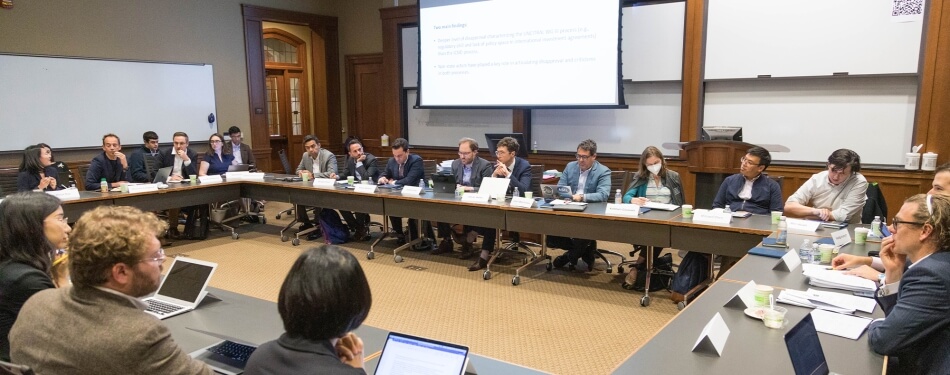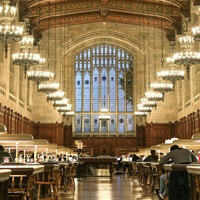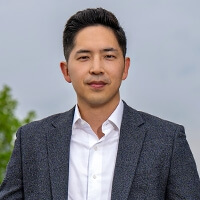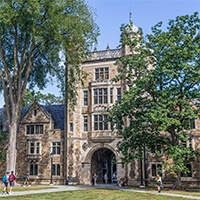International law scholars from around the world gathered at the University of Michigan Law School recently to focus on improving the system of investor-state dispute settlement (ISDS).
ISDS is a mechanism of international law by which foreign investors can sue governments for taking actions they see as harmful to their investment. The right to pursue ISDS suits is typically part of an international treaty, and the suits take place in independent tribunals rather than a nation’s own courts.
The ISDS system is widely seen as flawed for reasons like high costs, inconsistent rulings, and perceived bias in favor of investors. Efforts are under way to reform the system, most notably by a working group of the United Nations Commission on International Trade Law (UNCITRAL).
Addressing ISDS reform
The recent gathering at Michigan Law was a plenary meeting of the Academic Forum on ISDS, conducted in cooperation with the newly launched University of Michigan Program on Law and the Global Economy. At the two-day meeting, international investment law scholars from six continents presented and discussed a variety of academic papers related to ISDS and particularly the UNCITRAL reform process.
“The level of buy-in by every single person was so high,” said Professor Julian Arato, who organized the gathering. “The spirit of the discussion was something special—rigorous, but also deeply cooperative, creative, and generative.”
In addition to the presentation of academic papers, conference attendees heard an opening keynote address from Mélida Hodgson of Arnold & Porter, a former US trade official who is now the president-elect of the American Society of International Law. She discussed a number of shortcomings of the ISDS process and her view of proposed changes, and also noted the slow progress toward reform.
“It’s striking how similar the concerns are today to the way they were when we were dealing with the backlash against NAFTA 20-something years ago,” she said, citing a lack of transparency as one example. “What has been surprising in some respects, disappointing in others, is that in the last 18 years or so since I left the government, these concerns really haven’t gone away. We are still examining the same issues, even five years into the reform process.”
On the second day of the conference, Malcolm Langford of the University of Oslo gave the inaugural Daniel Behn Memorial Lecture, presented in remembrance of one of the founding members of the Academic Forum on ISDS. Langford discussed issues of ISDS reform in connection to three core themes in Behn’s research—empiricism, complexity, and psychology.
“How do we solve the ISDS legitimacy crisis?” Langford asked, posing a question central to his collaborative work with Behn. “There is no easy answer. It is a complex problem. Critics charge that the sprawling, interlocking system of treaties and arbitration is pro investor and pro Western, played by undue secrecy, conflicting jurisprudence, and excessive damages and costs—and the state’s regulatory autonomy and respect for human rights and environment is lost in the rush to uphold investor claims. Yet there is little consensus on the veracity of such claims, and the regime constitutes one of the most polarized areas in international relations and domestic politics.”
Law and the Global Economy
The ISDS forum represented the kickoff event for Michigan Law’s Program on Law and the Global Economy, which serves as a hub for the study of international economic law—from the regulation of cross-border trade and investment to international tax and finance to comparative and transnational commercial law.
The new program—unique among top-tier law schools—builds on Michigan Law’s extensive history in international law, which dates back to the school’s founding charter. Yet the program goes well beyond what’s thought of as traditional international law to encompass other areas of law, Arato noted.
“Basic commercial law has an effect on the globalization process. Basic property rights and all sorts of comparative and constitutional law issues come into the mix. There’s domestic law, there’s transnational law, there’s supranational law—and it became clear that if we wanted to study the process of globalization as it has occurred through law, it was too constraining to focus on just public international law,” Arato explained.
The new program therefore provides a forum for scholars to engage across different fields, as well as for dialogue involving students, practitioners, and policymakers. The program will present a conference every year, focusing on different topics, as well as other events. Next up, the program will serve as a co-sponsor of the Transnational Law Conference in March, along with Michigan Law’s Center for International and Comparative Law, focusing on “The International Law of Money.”
Arato, who is the faculty director of the Center for International and Comparative Law, said Michigan is a natural home for the Program on Law and the Global Economy, both because of its international expertise and the interdisciplinary nature of its faculty.
“We’ve developed serious expertise in comparative corporate law across a number of scholars, and other areas like private law theory with international perspectives. And all of those people can be brought together in an interesting way,” he said.
At the same time, though, faculty think beyond their expertise to a holistic view of the law. “Here at Michigan we talk to each other and engage with one another’s work across disciplines, and find connections and bridges and linkages and write together. And that’s actually pretty uncommon,” Arato said.
“So while we have all these pockets of expertise that relate to the broader issues of the global economy and globalization, we’re also the kind of place where scholars want to talk to each other and engage in common projects. What makes this faculty special is not just its expertise–it’s a culture. Michigan is the kind of place where we can have generative discussions on the future of law and world society.”
To stay up to date on the Program on Law and the Global Economy, watch the program’s website or email the Center for International and Comparative Law and ask to be put on its mailing list.







